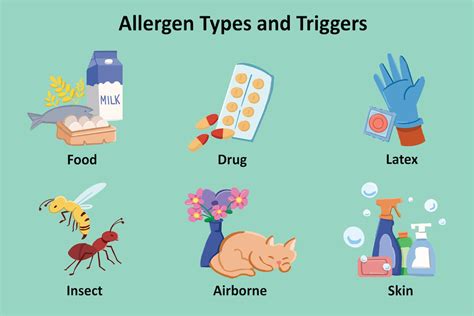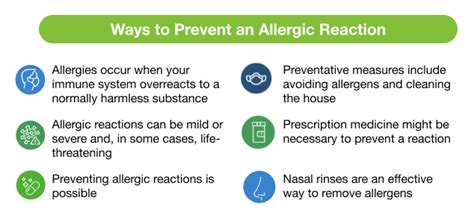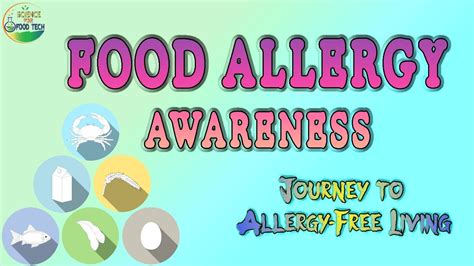Intro
Learn how to treat allergic reactions now with effective remedies, symptoms identification, and emergency response, managing anaphylaxis, hives, and itching with proper medication and care.
Allergic reactions can be a serious and potentially life-threatening condition that requires immediate attention. Whether it's a mild skin rash or a severe anaphylactic reaction, treating allergic reactions promptly and effectively is crucial to preventing long-term damage and ensuring the individual's safety. In this article, we will delve into the world of allergic reactions, exploring their causes, symptoms, and treatment options, as well as providing practical tips and advice on how to manage and prevent them.
Allergic reactions occur when the body's immune system overreacts to a harmless substance, such as pollen, dust, or certain foods. This can trigger a range of symptoms, from mild discomfort to life-threatening anaphylaxis. According to the Centers for Disease Control and Prevention (CDC), food allergies alone affect approximately 4% of adults and 8% of children in the United States, highlighting the importance of understanding and addressing allergic reactions. The prevalence of allergic reactions is a growing concern, and it's essential to stay informed about the latest research, treatments, and prevention strategies.
The impact of allergic reactions on daily life can be significant, affecting not only the individual but also their family and friends. Allergic reactions can cause anxiety, stress, and fear, making it challenging to participate in everyday activities, such as eating out, traveling, or engaging in social events. Moreover, the economic burden of allergic reactions is substantial, with estimated annual costs exceeding $25 billion in the United States alone. Therefore, it's crucial to prioritize allergic reaction treatment and prevention, ensuring that individuals can live safely and confidently.
Treating Allergic Reactions

Treating allergic reactions requires a comprehensive approach that involves understanding the causes, recognizing the symptoms, and administering prompt and effective treatment. The primary goal of treatment is to alleviate symptoms, prevent further reactions, and ensure the individual's safety. This can be achieved through a combination of self-care measures, medication, and medical attention. For instance, antihistamines, such as diphenhydramine, can be used to relieve mild to moderate allergic reaction symptoms, while epinephrine auto-injectors, like EpiPens, are essential for emergency situations.
Medications and Treatments
There are several medications and treatments available to manage allergic reactions, including: * Antihistamines: These medications can help relieve symptoms such as itching, sneezing, and runny nose. * Corticosteroids: These medications can reduce inflammation and swelling. * Epinephrine: This medication is used to treat severe allergic reactions, such as anaphylaxis. * Immunotherapy: This treatment involves regular injections of small amounts of the allergen to build up tolerance.Causes and Triggers of Allergic Reactions

Allergic reactions can be triggered by a wide range of substances, including foods, pollen, dust, pet dander, and insect stings. Understanding the causes and triggers of allergic reactions is crucial to preventing and managing them. Some common causes of allergic reactions include:
- Food allergies: Peanuts, tree nuts, milk, eggs, fish, shellfish, wheat, and soy are common food allergens.
- Insect stings: Bee stings, wasp stings, and ant stings can cause allergic reactions.
- Pollen: Tree pollen, grass pollen, and weed pollen can trigger allergic reactions.
- Pet dander: The skin and saliva of pets, such as cats and dogs, can cause allergic reactions.
Prevention Strategies
Preventing allergic reactions requires a proactive approach that involves avoiding triggers, reading labels carefully, and being prepared for emergencies. Some effective prevention strategies include: * Avoiding known allergens * Reading food labels carefully * Carrying an EpiPen or other emergency medication * Informing friends, family, and colleagues about allergies * Wearing a medical alert necklace or braceletManaging and Preventing Allergic Reactions

Managing and preventing allergic reactions requires a comprehensive approach that involves understanding the causes, recognizing the symptoms, and taking proactive steps to avoid triggers. This can be achieved through a combination of self-care measures, medication, and medical attention. Some effective management and prevention strategies include:
- Keeping a food diary to track symptoms and identify potential allergens
- Developing an emergency action plan in case of an allergic reaction
- Informing healthcare providers about allergies and medical history
- Staying up-to-date with the latest research and treatment options
Emergency Preparedness
Being prepared for emergencies is crucial to managing and preventing allergic reactions. This can be achieved by: * Carrying an EpiPen or other emergency medication * Informing friends, family, and colleagues about allergies * Wearing a medical alert necklace or bracelet * Keeping a list of emergency contact numbers and medical informationLiving with Allergic Reactions

Living with allergic reactions can be challenging, but it's not impossible. With the right treatment, management, and prevention strategies, individuals can lead safe and healthy lives. Some effective ways to live with allergic reactions include:
- Staying informed about the latest research and treatment options
- Building a support network of friends, family, and healthcare providers
- Developing a positive and proactive attitude towards managing allergies
- Focusing on overall health and wellness to reduce the risk of allergic reactions
Coping with Emotional Stress
Coping with the emotional stress of living with allergic reactions is essential to maintaining overall health and well-being. This can be achieved by: * Seeking support from friends, family, and support groups * Practicing stress-reducing techniques, such as meditation and yoga * Focusing on positive and uplifting activities * Celebrating successes and accomplishmentsConclusion and Next Steps

In conclusion, treating allergic reactions requires a comprehensive approach that involves understanding the causes, recognizing the symptoms, and administering prompt and effective treatment. By staying informed, being prepared, and taking proactive steps to manage and prevent allergic reactions, individuals can lead safe and healthy lives. We encourage readers to share their experiences, ask questions, and seek support from healthcare providers and support groups. Together, we can work towards creating a safer and more inclusive environment for individuals with allergic reactions.
What are the most common causes of allergic reactions?
+The most common causes of allergic reactions include food allergies, insect stings, pollen, and pet dander.
How can I prevent allergic reactions?
+Preventing allergic reactions requires a proactive approach that involves avoiding triggers, reading labels carefully, and being prepared for emergencies.
What should I do in case of an allergic reaction emergency?
+In case of an allergic reaction emergency, call 911 or seek immediate medical attention. Administer epinephrine if available, and provide any relevant medical information to healthcare providers.
We invite readers to comment, share this article, and take specific actions to manage and prevent allergic reactions. By working together, we can create a safer and more inclusive environment for individuals with allergic reactions. Remember to consult with healthcare providers, stay informed, and prioritize your health and well-being.
